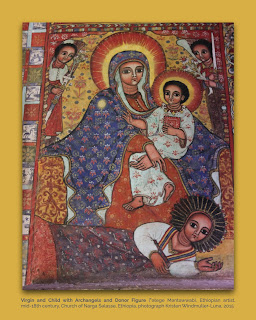Adapt, Reject, and Remix: Ethiopian Christian Art in the Early Modern Era
Kristen Windmuller-Luna, Curator of African Art, Cleveland Museum of Art
March 14, 6:00 pm, Stone Auditorium
Abstract: The rulers of the Ethiopian Christian kingdom (1270–1974) and its predecessor the ˀAksumite Kingdom (ca. 1st–8th century CE) had long sought luxury goods from across Europe and Asia. Locally-made and imported art, textiles, and religious objects contributed to a cosmopolitan Ethiopian Christian visual culture well-documented in local visual and textual sources. This paper focuses on the early modern era, when a 1557–1632 European Jesuit mission introduced new Catholic art to the kingdom and trade with India grew. Contrary to earlier scholarship that minimized Ethiopian Christian art as “conservative” or “derivative,” Dr. Windmuller-Luna presents a series of case studies to show how Ethiopian artists asserted considerable agency and innovation in their use of non-local models by selectively remixing, adapting, and even rejecting foreign influences while simultaneously using historical imagery to communicate sacred and political messages.
Image:
Virgin and Child with Archangels and Donor Figure (ˁətege Məntəwwab), Ethiopian artist, mid-18th century, Church of Narga Śəlasse, Ethiopia, photograph Kristen Windmuller-Luna, 2015
